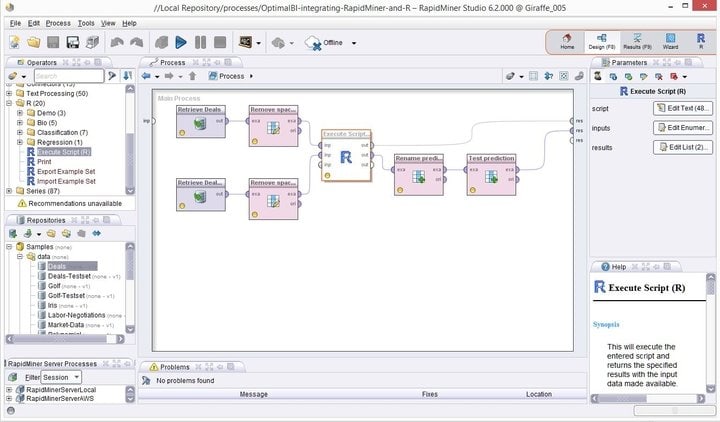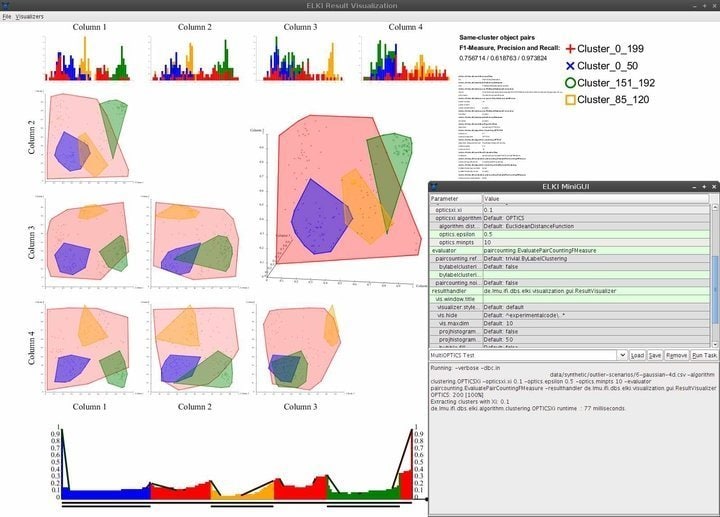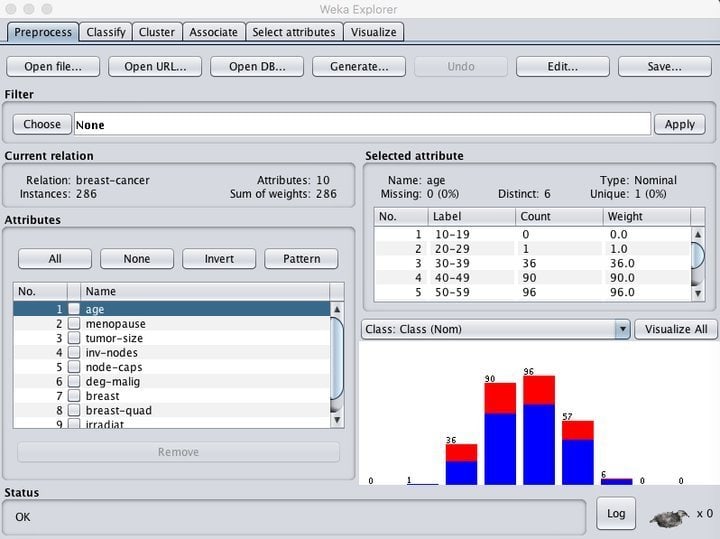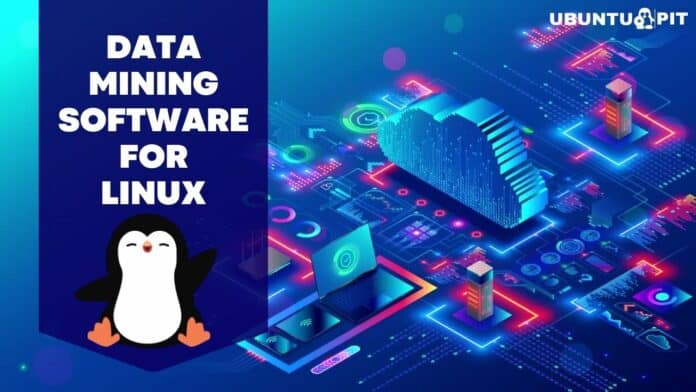Data mining is the process of analyzing large amounts of data to obtain useful information. It has incredibly diverse applications in the fields of academic research and business. Researchers use data mining to infer new solutions to computational research problems, while corporations depend on it to gain the upper hand in business revenues.
Companies like Amazon utilize different data mining techniques to improve their product recommendation engine, while search giants like Google and Microsoft leverage them to rank their search engine results effectively.
Thanks to the increasing demand for Data Science in general, a plethora of robust data mining software for Linux has been shipped in the past decades. Stay with us to know more about the top 20 Linux data mining software.
Best Data Mining Software for Linux
Data mining covers a lot of Data Science topics, including the collection of data, statistical analysis, concepts of artificial intelligence, and of course – programming. Due to their massive domain, Data Mining tools come in different flavors, developed for performing different things. Thus, our experts have picked a versatile range of data mining software for Linux that, used creatively, can perfectly cater to modern data engineers’ requirements.
1. Rapid Miner
The pinnacle of modern Linux data mining software, Rapid Miner, is way above others whenever it comes to discussing reliable data mining platforms. Known formerly as YALE, it is a powerful and flexible data mining suite featuring a substantial amount of robust features to enhance your mining skills to the next level. Rapid Miner is developed on top of the Java programming language and does precisely what its name implies – fastening your data mining projects.

Features of Rapid Miner
- Rapid Miner comes with a minimal yet intuitive GUI interface, with an additional command-line version for terminal geeks.
- This robust and flexible visual environment for predictive analytics allows users to analyze big data without explicit programming.
- An enormous list of flexible extensions is available, enabling you additional functionalities from what you get during the first-time installation.
- You can easily integrate this powerful data mining software for Linux in personalized data mining projects.
2. R
R might be a familiar name to CS graduates with adequate knowledge of programming. But it’s of much more value to a data scientist. Briefly speaking, R is a complete environment for the statistical analysis of data and graphics.
It’s a highly flexible data mining platform offering powerful analytical techniques like modeling, statistical tests, time-series analysis, classification, and clustering, among many others. If you’re a professional with superior programming skills, R might turn out to be the best weapon in your arsenal.
Features of R
- R offers a robust and effective solution for storing and handling massive amounts of corporate data.
- A plethora of built-in and coherent data analysis tools ensures engineers can leverage R for a wide array of data mining projects.
- It’s easy to debug problems inside existing data mining projects due to R’s robust error-playing abilities.
- R is widely employed for large-scale data mining projects and features an enormous list of pre-built solutions by open-source enthusiasts.
3. Orange
If you’re a data scientist with a background in CS, you might already be familiar with Orange. For the rest of you, think of it as a robust data mining software for Linux built on top of Python.
In general, Orange offers a flexible and rewarding set of Python libraries capable of dealing with modern-day data mining techniques such as classification, modeling, regression, and clustering alongside tools for data visualization and preprocessing.

Features of Orange
- Its powerful visual programming tool called Orange Canvas enables beginners to build quick data mining solutions using its productive workflow management capabilities.
- It comes with a robust set of premium visualization tools for decision trees, attribute subsets, bagging, boosting, and many more.
- According to their requirements, Orange comes under the GNU GPL license, thus allowing programmers to modify or customize this free data mining software.
- You can pick Orange right now and integrate it with your existing data mining projects for additional capabilities, including over 100 pre-built widgets.
4. MOA
MOA, short for Massive Online Analysis, does exactly what its name says. It is an innovative data mining software for Linux with a primary emphasis on mining large data streams. MOA aims to equip aspiring data scientists with a powerful yet flexible data mining platform that will enable them to effectively test various data mining algorithms on continuously evolving data streams.
MOA has a robust collection of standard machine learning methods, including classification, regression, clustering, outlier detection, and recommendation systems.
Features of MOA
- MOA offers three different interface options: a GUI interface, a console-based one, and a flexible Java-based API for online integration.
- It packages flexible change detection algorithms to determine as much information as possible from real-time data streams.
- This open source data mining software is suited to those who want to leverage real-time data for their mining processes.
- MOA features an open source GNU GPL license and thus requires no legal formalities for customization or modification.
5. ROOT
You can depend on a data mining platform developed by CERN, can’t you? ROOT is an immensely powerful Linux data mining software to solve real-world challenges involving massive amounts of high-energy physics data.
It soon gained popularity among data scientists working in different areas and is currently used widely for data mining and astronomical data analysis. If you’re a science grad with a deep interest in particle physics, this is the real platform for you.

Features of ROOT
- ROOT allows an immensely useful visualization of data distributions and mining algorithms through its highly flexible histogramming and graphing features.
- You can analyze 2D objects like lines, polygons, arrows, plots, and histograms alongside 3D graphical objects in this data mining software for Linux.
- ROOT provides several four-vector computational tools and image manipulation capabilities for the practical analysis of real-world datasets.
- The software is primarily written in C++ but utilizes Python and R to maximize its data mining functionalities.
6. DataMelt
One of the best Linux data mining software for researchers and engineers, DataMelt offers a comprehensive set of powerful yet flexible functionalities for analyzing big datasets.
It is arguably among the most convenient data mining platform for beginners looking forward to boosting their data science careers. Formerly known as SCaVis, this enigmatic data mining software binds enormous open-source software packages into a coherent interface.
Features of DataMelt
- DataMelt implements a substantial amount of its data manipulation and plotting tools in Java and utilizes Jython for scripting purposes.
- Powerful Python macros have enabled data scientists to visualize real-world data, histograms, and 3D structures.
- The built-in integrated development environment(IDE) utilizes flexible JAIDA FreeHEP libraries and allows syntax highlighting, code completion, a program analyzer, and a Jython shell.
- The open source licensing of this data mining software for Linux allows data scientists to extend the software as required.
7. Rattle
Rattle (the R Analytic Tool To Learn Easily) is a free data mining software that provides a powerful interface to R’s data mining and binary classification functionalities. It also provides a handy business intelligence suite known as RStat for corporations and data scientist professionals. Rattle allows users to import datasets from either CSV files or ODBC and explore them to model their data mining solutions.
Features of Rattle
- Rattle enables data scientists to develop and analyze complex data models and export them either as PMML (predictive modeling markup language) or as scores.
- It’s a full-fledged Linux data mining software that can be readily used for large-scale data mining by corporations, governments, and research institutions alike.
- Data can be loaded from many sources, including CSV, TXT, Excel, ARFF, ODBC, and RData Files, plus Corpus and Scripts.
- The machine learning techniques featured by this data mining platform include decision trees, random forests, support vector machines, logistic regression, neural net, and others.
8. ELKI
ELKI is an immensely powerful Linux data mining software written in the Java programming language. It aims to make data mining accessible to people who don’t hold professional data science certifications. It is one of the most used data mining platforms in research and teaching foundations due to its impressive collection of robust data mining features.
ELKI has built-in support for almost every popular data mining algorithm, including clustering, classification, managing database indexes, and outlier detection.

Features of ELKI
- ELKI has a minimal yet elegant user interface that provides just about the necessary navigational abilities.
- The visualization abilities include but are not limited to histograms, ROC curves, OPTICS plots, parallel coordinates, Voronoi cells, alpha shapes, and more.
- ELKI employs several R-tree splitting and bulk loading strategies for effectively structuring indexes.
- This data mining software for Linux enables data scientists to explore and evaluate geographical data using robust spatial outlier detection features.
9. KNIME
KNIME is arguably one of the most innovative open source data mining software we could get our hands on. It provides a comprehensive and flexible data mining platform, boasting coherent features for data integration, processing, analysis, reporting, and evaluation tasks.
KNIME allows the creation of visual workflows called pipelines for enabling data scientists to investigate complex real-time datasets. The software is highly scalable and can be integrated into future projects without any hurdles.
Features of KNIME
- The GUI interface of this free data mining software is very intuitive, encompassing the specific navigational abilities required in modern-day data mining.
- KNIME sits on top of the Eclipse Interactive Development Environment and leverages its robust APIs for grant extensibility to open-source enthusiasts.
- A handy console-based user interface is shipped to allow batch executions through automated scripts.
- KNIME supports a wide array of data mining techniques, including clustering, rule induction, association rules, Bayesian networks, neural networks, and many more.
10. Weka
Weka, short for Waikato Environment for Knowledge Analysis, is a compelling data mining software for Linux. It offers an extensive set of machine learning software written in Java, including algorithms for conventional data mining techniques such as decision trees, support vector machines, instance-based classifiers, clustering, Bayes nets, neural networks, and many more.
Weka comes with bi-directional integration capabilities with MOA and thus can be used heavily in areas where the processing of real-time data streams is mandatory.

Features of Weka
- Weka’s powerful data visualization and processing abilities make evaluating large-scale datasets much more straightforward than most free data mining software.
- The built-in graphical user interface (GUI) is intuitive and makes applying the machine learning algorithms relatively comfortable.
- The flexible API makes embedding Weka into existing or future data mining projects hassle-free.
- Weka’s robust environment allows rewarding data preprocessing abilities to make the most out of industrial or research data.
11. KEEL
KEEL stands for Knowledge Extraction based on Evolutionary Learning, and as the name implies, it is a Linux data mining software for assessing evolutionary algorithms. It is a powerful data mining platform that provides advanced functionalities to help engineers bring new data mining solutions while providing researchers with a mesmerizing platform for scientific undertakings.
KEEL is written using the powerful interpreted programming language Java and ships with an open-source GNU GPL license.
Features of KEEL
- The user interface of KEEL is simple visually, yet it provides all the navigational power required to manage the software effectively.
- It comes with a pre-built set of extensive evolutionary algorithms to predict models, preprocessing methods, and postprocessing procedures.
- KEEL offers over 100 different algorithms for data transformation, discretization, feature selection, noise filtering, and many more.
- It’s among those few data mining software for Linux that comes with extremely accurate data reduction methodologies alongside functions for extracting rules based on patterns.
12. Apache Mahout
Apache Mahout is one of the most used data mining platforms by professional data scientists due to its substantial empowering features. It is primarily an open source collection of frequently used machine learning techniques and their implementations to help cluster, classify, and frequent pattern recognition in large-scale datasets.
Due to its flexibility, many notable tech giants leverage Apache Mahout for real-time data mining, including Adobe, AOL, Drupal, and Twitter.
Features of Apache Mahout
- This data mining software for Linux integrates with the Apache Hadoop stack very well, thus offering an excellent platform for people looking for distributed data mining solutions.
- Data scientists can leverage Mahout on top of Apache Spark as the back-end for implementing flexible and highly scalable data mining projects.
- Mahout comes with native support for CPU/GPU/CUDA acceleration, thus allowing you to leverage the maximum processing power you can get.
13. Sisense
Sisense is arguably among the best data mining software for Linux beginners. It provides data scientists with the specific features required for diving into massive datasets and discovering crucial insights like customers’ shopping habits, search rankings, and other business analytics.
Sisense offers a compelling dashboard, making it reasonably straightforward to explore and visualize large amounts of unprocessed data. If you’re coming into data mining from a non-technical background, Sisense might be the best data mining platform for you.
Features of Sisense
- Sisense allows data science professionals to connect with any number of data sources – both structured and unstructured.
- The user interface is intuitive, and the dashboard provides a highly interactive workflow for visualizing large-scale disparate data sources.
- Sisense can be readily employed in enterprises, government institutions, healthcare management, supply chains, manufacturing, and other types of corporations.
- Sisense allows for a handy drag-and-drop feature empowering data scientists to manage their projects with superior productivity.
14. Databionic
The Databionic ESOM tools offer a plethora of rewarding and flexible data mining techniques such as clustering, visualization, and classification with Emergent Self-Organizing Maps (ESOM) that enable data scientists to analyze large-scale data for business analytics.
Developed in Germany, Databionic provides almost every necessary functionality you’d look for in modern-day Linux data mining software. It comes under a free and open source GNU GPL license and encourages professionals to tweak the software as they see fit.
Features of Databionic
- This data mining software for Linux uses the Java programming language and offers maximum portability and extensibility.
- To ease your data mining projects, a compelling set of pre-built initialization methods and training algorithms are shipped with Databionic.
- Databionic enables you to effectively visualize high-dimensional and disparate datasets with U-Matrix, P-Matrix, Component Planes, and SDH.
- Users can quickly build personalized ESOM classifiers for automating their data mining tasks with Databionic.
15. Anaconda
Anaconda is an extremely innovative, powerful, and open source data mining software powered by Python, the holy grail of data science programming languages. Industry leaders, including CISCO, Bloomberg, and BMW, utilize this awe-inspiring data mining platform to stay on top of their fellow competitors and curate new analytics solutions. Anaconda is often a mandatory requirement for companies hiring data scientists due to its extensive usage in the field.
Features of Anaconda
- Anaconda allows data scientists to harness the might of data science, machine learning, and AI – all from a single platform and deploy projects with a single click of the mouse.
- This free data mining software has an extensive set of pre-built data science packages for Python, R, and Scala.
- Anaconda ships with a BSD license, allowing developers to leverage it to build robust data mining solutions without any legal hassle.
- Integrating this modern-day data mining software for Linux with other data science software in your arsenal is relatively simple.
16. Shogun
Shogun is, as the developers call it – a unified and efficient machine learning library aimed at solving real-world problems involving big data and, of course – data mining. It is one of the best data mining software for Linux that provides top-notch functionalities and makes sure they can be leveraged as the users want them to. Shogun might be the perfect tool if you’re looking for robust open source data mining software.
Features of Shogun
- Shogun features an extensive range of data mining features, including but not limited to classification, regression, dimensionality reduction, support vector machines, and such.
- It offers a full-fledged implementation of powerful hidden Markov models for enhancing your data mining capabilities right out of the box.
- The user interface is fully hackable and can integrate with futuristic projects too well, thanks to its robust APIs.
- Shogun performs relatively much better than regular Linux data mining software, owing to its gratitude to C++.
17. GNU Octave
GNU Octave is an extremely powerful yet user-friendly scientific computing solution that features a robust high-level programming language similar to MATLAB in many ways. It has widespread usage in the areas of numerical computing and syncs perfectly with most MATLAB implementations.
Data scientists can leverage this mesmerizing data science platform for analyzing diverse ranges of real-time data and dig out potentially rewarding insights from them.
Features of GNU Octave
- GNU Octave aims to solve linear and nonlinear numerical problems and runs seamlessly on Linux, macOS, BSD, and Windows.
- The syntax of its high-level programming language is identical to MATLAB and can operate on vectors and matrices.
- This Linux data mining software’s powerful mathematics-oriented data visualization capabilities help analyze large amounts of data without requiring external tools.
- The software comes with a GUI interface and a command-line variant for enhancing productivity to the highest level.
18. Apache UIMA
Apache UIMA is a highly modular informatics management and analysis system that has gained immense popularity among data scientists due to its compelling data mining functionalities.
UIMA stands for Unstructured Information Management Architecture and, as the name already suggests, is an analytic tool for exploring unstructured data. This data mining software for Linux provides a select set of flexible features to discover useful insights from large volumes of disparate data.
Features of Apache UIMA
- It is a Java-based data mining framework for analyzing and evaluating massive datasets involving real-time unstructured data.
- UIMA is hugely scalable and can be used as network services and processing pipelines.
- This Linux data mining software facilitates the analysis of multimedia content, such as audio and video data.
- The software suite comes under an Apache license and is thus free to use and modify by users.
19. Turi Create
Turi is arguably among the most excellent data mining software for Linux we’ve tested during our compilation of this guide. Known previously as Graphlab Create, Turi offers a plethora of robust data science functionalities to build highly modular, scalable data mining solutions. Turi boasts a wide range of diverse, high-performance, distributed computation features and can greatly simplify the development of custom data-mining programs.
Features of Turi Create
- This Linux data mining software is based on graphs and focuses more on tasks than algorithms.
- Although the software doesn’t require any external graphic processing unit (GPU), using one can significantly boost performance.
- Apart from standard text and image data, Turi has built-in support for audio, video, and sensor data.
- It is written using the C++ programming language and is one of the fastest data mining software we’ve tested.
20. ROSETTA
Marketed by the devs as a rough set toolkit for data analysis, ROSETTA is a general-purpose tool for discernibility-based modeling with very compelling use cases in the field of data mining.
It is a powerful framework for analyzing tabular data and offers robust knowledge discovery functionalities. You can utilize ROSETTA in preprocessing large-scale datasets, computing attribute sets, generating rules, and many more.
Features of ROSETTA
- This data mining software for Linux comes with an incredibly intuitive GUI interface with very productive navigational abilities in place.
- Users can integrate this data mining platform with database management systems (DBMSs) via ODBC relatively easily.
- ROSETTA comes with in-built support for both unsupervised and supervised machine learning models.
- The robust set of advanced filtering methods makes postprocessing reasonably simple.
Ending Thoughts
Due to its diverse application in real life, data mining software for Linux tends to vary in flavor and functionality. Some of the most popular data mining tools include Rapid Miner, R, Orange, ELKI, MOA, Weka, ROOT, and DataMelt.
So, when selecting the right Linux data mining software, you must choose programs that meet your requirements. Hopefully, we can provide you the essential insights into some of the most widely used data mining tools.
You should now be able to select the one that does the job for you perfectly. Thanks for your patience, and don’t forget to check us out for regular posts on exciting Linux software and tutorials.

Thanks, this is very good overview. It would be useful also to know which packages run on Windows. I’ve tried DataMelt on Windows 10, and it works fine. I guess, other programs are ELKI, and Weka, since written in Java?